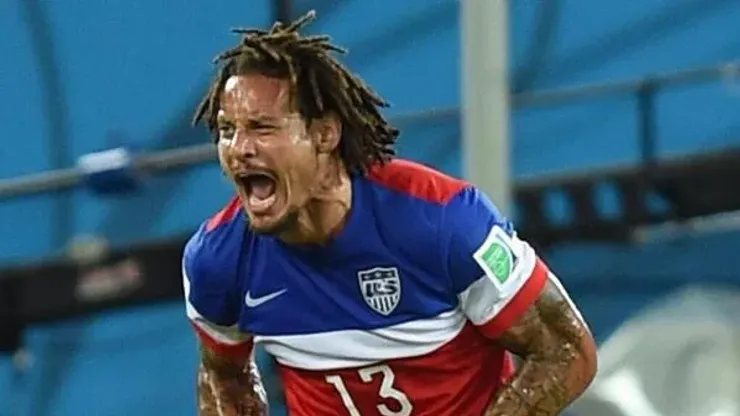
The transfer of Jermaine Jones to MLS is a great moment for the league. After his stellar play in the World Cup, the veteran midfielder was out of contract and needing one more shot at being a contributor in a major league. His agent and the Chicago Fire had been holding serious negotiations and the Fire appeared to be on the cusp of a real coup just in time for a playoff run.
Then the process took over, and as The Washington Post outlines, it is not the one that seemingly existed until now.
For those new to the MLS overseas player acquisition process, it may be useful to do a quick recap of how we got here. Originally, to make the process equitable for acquiring overseas talent, MLS created an allocation system whereby teams were ranked based on record last season. So if a U.S. international wanted to play in MLS, the team with the worst record last season would have the first shot at signing them. Picks could be traded, but for the most part it was a fair system.
Then the major superstars started to come home. The league was faced with a quandary – should they allow stars like Clint Dempsey to play for high-profile teams which would help the league’s brand, or should they go to a struggling team outside the limelight because they pick first in allocation? Depending on your perspective, the league either changed the rules completely or found an exception and, for certain high-caliber players, teams could negotiate directly with the players and sign them independent of the allocation process. That is why Dempsey is in Seattle and Michael Bradley is in Toronto, and neither is with a Chivas USA or San Jose.
Naturally, because Jermaine Jones is a USMNT player, Chicago should have a right to sign him directly, right? Then why will he be introduced in a New England Revolution jersey in the near future?
Here’s what the Revs’ press release said:
Jones, as a designated player of a certain threshold, was not subject to allocation ranking for dispersal to an MLS team. The Revolution and Fire expressed an interest in Jones, and had the available salary budget and a designated player slot to accommodate him. Following a blind draw between the two clubs, Jones was assigned to the Revolution.
Somehow, the league intervened between Chicago and New England and decided Jones’ fate through a “blind draw”. Never mind the fact The Washington Post claims Jones wanted to play in Chicago, the league felt it necessary to create a new mechanism to determine where a national team player plays.
This could all be casually ignored except for the history of Bob Kraft and MLS. Kraft was a founding owner and one of the biggest proponents of the single-entity system that allows ownership and the league office to tightly control financial matters, including player salaries. His team is one of two that still play in NFL stadiums with no clear plans to move. He has a large amount of influence in the front office because of his original owner status as well as the fact he briefly owned and controlled the San Jose Earthquake during a leadership transition. Sunil Gulati, president of the U.S. Soccer Federation, even serves as the president of Kraft Soccer Properties, tying him closely to the Revs owner.
It’s easy to draw a theory that Kraft finally wanted to spend money on his team’s salaries and used his influence with USSF and the league to create a new mysterious player allocation system. Is this all conspiracy theory? Perhaps, but because MLS’s player acquisition rules are so easily modified it is impossible for fans and the media to have a clear sense of how these processes occur. For example, we are not even sure how the blind draw was conducted – ballots drawn or picking a number behind your back? We may never know. We do know that MLB, NFL, and NBA have no such process for determining how teams can acquire an overseas player. Baseball does have a blind bid system, but that at least lets people know that a team was the higher bidder for a player and how much they’d pay for his rights.
The sad thing is this entire process could have been done by the book and Kraft could have fairly won the rights to sign Jones. But since MLS operates in secret and has no consistent application of its own rules when it comes to player acquisition, it is acceptable to be skeptical that this whole process occurred above board. While this should be a wake-up call regarding its own rules, I suspect sadly the league will simply ignore the outcry and pivot again when it needs to accommodate another player or influential owner.
200+ Channels With Sports & News
- Starting price: $33/mo. for fubo Latino Package
- Watch Premier League, Liga MX & Copa Libertadores
The New Home of MLS
- Price: $14.99/mo. for MLS Season Pass
- Watch every MLS game including playoffs & Leagues Cup
Many Sports & ESPN Originals
- Price: $10.99/mo. (or get ESPN+, Hulu & Disney+ for $14.99/mo.)
- Features Bundesliga, LaLiga, NWSL, & USL
2,000+ soccer games per year
- Price: $7.99/mo
- Features Champions League, Serie A, Europa League & EFL
175 Premier League Games & PL TV
- Starting price: $7.99/mo. for Peacock Premium
- Watch 175 exclusive EPL games per season